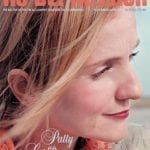Ware River Club – Looking for a Way In
Sometimes a great roots band takes many twists and turns before it finds its voice. Growing up in the working-class Massachusetts mill town that supplied his band’s name, Matt Hebert heard the rumblings of early heavy metal courtesy of his older siblings along with the sweet serenade of soft rock courtesy of AM radio. With his brother and sister already playing guitar, Hebert got bit by the music bug. Even though his folks didn’t care for rock, they supported Matt’s obsession, actually letting him trade in their stereo for a bass guitar.
Hebert had a life-changing moment when he first heard indie legends Husker Du: “I cut my hair, sold my metal records and got obsessive about Bob Mould,” he recalls. In eighth grade, he joined his first band, the Shit Farmers, to play Ramones songs at his high school. Hebert soon moved on to a new group called Hollapopper, which worshipped Firehose and the Replacements.
Saving up their money in the early 1990s, Hebert and his bandmates traveled 40 miles south to Northampton, a bohemian hub of colleges, clubs and coffeehouses. The group started packing small venues in the area. Hebert split his time in local group Miss Reed and in Zeke Fiddler’s band, but when he picked up a guitar and started writing songs, he knew he had to move on again.
In 1997, he gathered together a group of established local musicians (including guitarist/co-leader Matt Cullen) to form Ware River Club, even though Hebert himself didn’t have any reputation as a leader yet. Influenced by alt-country acts such as Son Volt, they cut their promising debut, The Bad Side Of Otis Avenue, in 1998.
After a reshuffle of the rhythm section, Hebert changed his musical outlook for the band’s appropriately titled Don’t Take It Easy on their own Natural Disaster label. “I wanted to do something different, thinking, ‘Let’s rock a bit more,'” he says.
Along with the more upbeat tempos, an interesting antisocial streak marked a number of songs on the disc, including “Burn”, in which the narrator declares in the chorus that he’s going to burn down a radio station. “The human condition is such an interesting thing,” Hebert muses. “I’m fortunate that I have an outlet for it.”
After a lot of legwork, the band began getting noticed, garnering opening slots for Emmylou Harris, the Jayhawks and Richard Buckner. When they were ready to record a third album two years ago, another direction change came. One of Hebert’s new numbers, a pretty song called “Broken Light”, made such an impression that they decided to model the whole record after it, working in a quieter tone. That meant not just scrapping songs that didn’t fit in and writing new material, but also searching for a record deal (they ended up on regional indie Spirithouse) as they took their time recording the new disc.
The result, Cathedral, is due out in March. Its theme of fighting off adversity by looking for support surfaces in songs such as “If I Accidentally Take Your Life” (featuring producer Danny Bernini’s son Gabriel), “Bring It On” (where the singer asks for patience from his girl), and “Up Again” (a whispering plea).
With an upcoming tour and a push behind the new record, Hebert sees this as a make-or-break time for the band. “We want to move up to the next level so we can just play music and not worry about the bills,” he acknowledges. “I’d love to spend my whole day writing and playing music. Who wouldn’t want to do that?”




